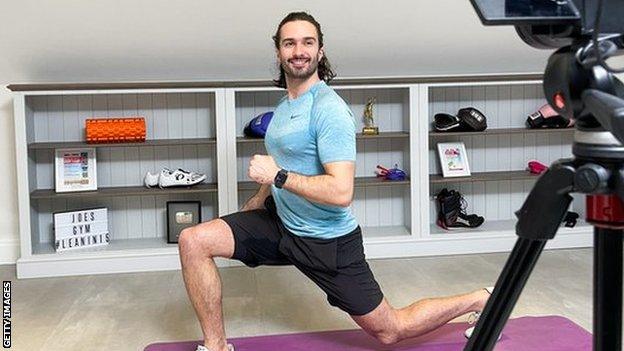Coronavirus: Experts 'deeply concerned' about the impact of Covid-19 on children's physical activity levels
- Published

Joe Wicks has restarted his online PE lessons this month to help families keep fit during lockdown
Experts are "deeply concerned" that the coronavirus pandemic has had a "huge impact" on children's physical activity levels.
New figures from Sport England show the majority of young people failed to meet the recommended 60 minutes of daily exercise in the 2019/20 academic year.
That was a decrease of almost 2% compared with the previous 12 months.
Almost a third of children (2.3 million) were classed as 'inactive' as a result of lockdown restrictions, not even doing 30 minutes per day, up by 2.5%.
The Active Lives, external survey showed the pandemic has also heightened existing participation inequalities with a 9% drop in activity levels by children and young people from a black background. Children from the most affluent families remain the most active.
In terms of gender disparities, there was a notable fall in activity among boys, who suffered from the stopping of team sport, while girls retained roughly their same activity levels, adapting well to alternative activities such as fitness and walking.
There was a drop of 16% in children taking part in sporting activities - team sports, athletics, running and swimming - but there was a sharp increase in walking, cycling and fitness activities.
Sport England CEO Tim Hollingsworth said: "The pandemic has had a huge impact on children and young people's engagement in sport and physical activity.
"While we are pleased to see the increase in more informal activities such as walking and cycling, which were possible during the periods of restriction, we can't underestimate the long-term effect on other sporting activities both in and out of school.
"Schools play a vital role in keeping young people active - and it's imperative they're in a position to facilitate physical activity the moment they can.
"Today's report reminds us that it has not impacted everyone equally. We owe it to the groups most affected to do all we can to get sport and physical activity up and running in all its forms.
Youth Sport Trust chief executive Ali Oliver said: "This research highlights the urgent need for a bold national plan to stop the decline in young people's development and wellbeing.
"Sport England's research confirms that activity levels which were already too low have declined further during the last year. Worryingly, the real picture for young people now may be even worse during this current period of remote learning for many, and bad weather.
"While we are deeply concerned at the number of young people who are inactive, the fact that 3.2 million young people remained active, and many took up new activities like walking, cycling and home fitness is reason for encouragement, and should give us all something to build on.
Jack Shakespeare, of ukactive., external which represents the physical activity industry, said: "It is clear that stark inequalities remain entrenched for many children across the country.
"The current national lockdown measures will further impact the physical and mental wellbeing of children and young people, with the cold weather and darker evenings at this time of year making physical activity targets even harder to achieve than before.
"This is why ukactive is urging government to formulate and execute an ambitious plan to get children moving again - one that supports children during lockdown and school closures, prioritises the reopening of youth activity when lockdown ends and drives a long-term and joined-up national activity strategy that truly puts the interests of each and every child at its core."